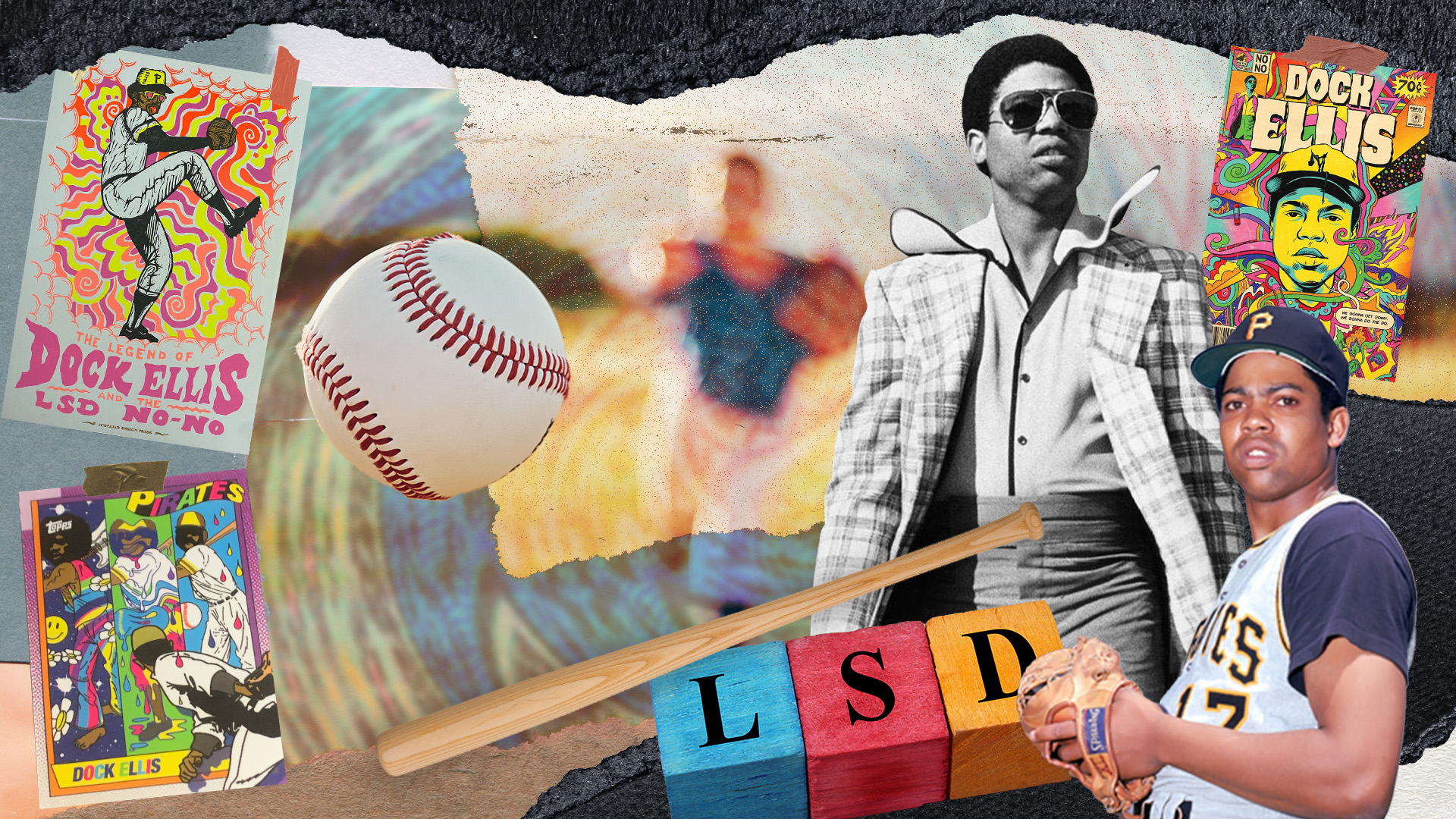Pitching a no-hitter is an incredibly difficult undertaking. To date, there have only been 322 no-hitters in MLB history. As pitching is about skill, in the vacuum of one game, luck plays a massive role.
An unexpected gust of wind can push the ball just outside the range of an outfielder’s glove. An uneven patch of dirt can cause the ball to bounce awkwardly just past a diving shortstop. The factors outside of a pitcher’s control are why some of the best players to throw a baseball have never had a no-hitter.
All of this build-up illustrates just how special Pittsburgh Pirate pitcher Dock Ellis’ 1970 no-hitter was. Not only did Ellis have to have the right speed and movement on his pitches and the luck involved with fielding routine ground balls and pop flys — but he also had to do all this in the middle of an intense LSD trip.
What follows is the tale of how Dock Ellis made baseball and psychedelic history.
Dock Ellis Makes History: A Wild LA Night
The night before that fateful game, Ellis visited a friend in Los Angeles. He spent the night drinking and partying, adding LSD to the mix at one point.
Ellis woke up the next morning in a daze. He couldn’t figure out what time it was, let alone the date. Most importantly, Ellis forgot that he had to pitch a game in San Diego later that afternoon.
In a temporary state of *idgaf*, Ellis took another drop of acid at noon. Two hours into his trip, Ellis’ girlfriend (and trip partner) looked at a newspaper and sprung up saying “Dock, you’re pitching today!”
Why You Should Get Your Medical Marijuana Card
Veriheal has satisfied millions of patients nationwide by giving them access to these benefits
- Larger purchase limits
- Peace of mind
- Enhanced legal protection
- Access to higher potency strains
- Save up to 25% on cannabis purchases
- Skip the line at the dispensary
The reminder came just in time as Ellis was able to make it to the airport to catch a flight to San Diego. A short hour later and Ellis was at San Diego Stadium — a full 90 minutes before he was set to hit the mound. And while microdosing psychedelics has a reputation for heightening awareness and improving self-expression, Ellis knew his macro-dose set him up for a wild ride. What he didn’t know was that this wild ride would make history, not only in the realm of psychedelics but in the world of baseball as well.
Turn On, Tune In, No-Hit
The fact that Ellis managed to pitch that night, let alone pitch a no-hitter, is nothing short of a small miracle. Ellis recalls not being able to feel the ball or see the signals his catcher was throwing. As Ellis put it,“I was zeroed in on the [catcher’s] glove, but I didn’t hit the glove too much.”
As the innings went by, Ellis’ LSD trip got more and more intense. By the fourth inning, Ellis started hallucinating, seeing Richard Nixon in place of the home plate umpire, imagining that he was “…pitching a baseball to Jimi Hendrix.” The rock and roll legend, naturally, “…was holding a guitar and swinging it over the plate.”
In his high state, Ellis hit a batter and walked seven more. Some batters even made contact with his wild pitches, causing a frazzled Ellis to jump out of the way in fear. Equal parts stressed and euphoric, Ellis remembers chewing his gum until it “… turned to powder.” Still, at the end of nine innings, not a single San Diego Padre batter was able to get a hit.
Ellis’s final stat line for the night was 9 innings pitched, 8 total walks, 1 hit batter, 6 strikeouts, and — most importantly — 0 hits.
Dock Ellis’ Legacy
After 12 years, 5 teams, and 1 all-star game appearance — Dock Ellis retired in the spring of 1980. In 1984, Ellis was finally ready to tell the world about his impressive feat. He sat down with San Francisco LSD publication Lysergic World and shared the full details of his legendary performance.
To date, the MLB has not released the full footage of Ellis’ no-hitter. However, you can watch some clips from the 2014 documentary about the performance No No: A Dockumentary.
Though the LSD no-hitter would come to define Ellis — who passed away in 2008 — and his MLB career, he was much more than that. Ellis’ was an activist who frequently spoke out about the MLB’s issues with institutionalized racism. After spending his playing career dealing with substance issues related to amphetamines, Ellis’ got sober after retirement and dedicated his time to helping prisoners kick their own addictions.
Author, Share & Comments








